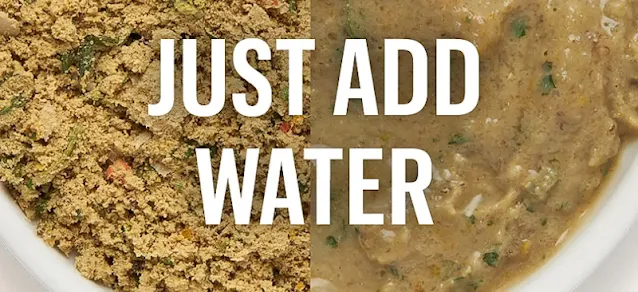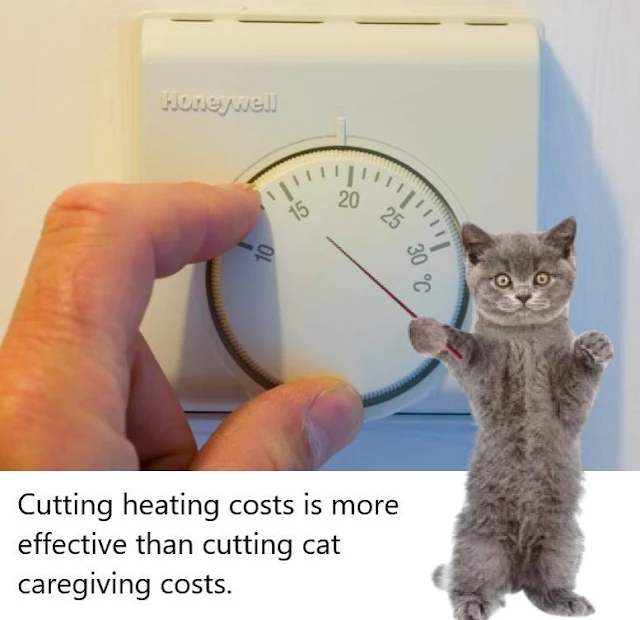Friday, 30 August 2024
Cat food should not be more expensive than human food but it often is
Saturday, 21 January 2023
Does anybody use dehydrated wet cat food?
I have never considered it but there is an "intermediate" type of cat food which is dehydrated wet cat food. It is shipped in packets as a powder. You pour out the amount that you think your cat can eat at one sitting. You add some warm water and it becomes a pâté or a soup depending upon how much water you add.
The advantages are that you can control the portion size and of course the storage of the food is easier. It is very compact and very long lasting. It gives the cat owner better control over cat food storage and delivery.
 |
| How many people use dehydrated wet cat food to feed their cat? Image: The Honest Kitchen |
I think this is important because often cats don't finish the portion provided because the sachet is too big or perhaps the owner gives them too much. I don't know how many millions of tonnes of wasted, smelly wet cat food is thrown away into garbage cans annually in any one country but I expect that it is a vast tonnage.
Anything to reduce cat food waste would be welcome. I think dehydrated wet cat food is a great way to control portion size as mentioned. There appear to be some downside. It is not that readily available it seems to me in the UK (for instance). It appears to be less common than conventional wet cat food and certainly much less common than dry cat food.
And of course, you've got to add warm water which means using the kettle. A small irritation but one nonetheless. And finally, it appears to be expensive. Some cat food nowadays is inordinately expensive. It looks more expensive than human food and cat owners don't have a bottomless pit of money.
There has to be a reasonable balance between the advantages of living with a cat and the expense of keeping a cat. Cat owners have a duty to provide high quality cat food and a lot of cat food is not of high quality particularly cheap dry cat food.
However, there is a limit and I suspect that the apparent lack of popularity of dehydrated wet cat food is due to its expense. Have you tried it?
If it is more expensive and it appears to be this may be due to the manufacturing process. It is dehydrated after all so all the moisture is taken out of wet cat food. That might be an expensive manufacturing process.
The point has to be made that it is impossible to try and make comparisons on price between the various types of cat food. It's far too complicated which is why I have questioned whether it is more expensive than conventional wet cat food.
If you have personal experiences of using dehydrated wet cat food then please share them in a comment. They would be most welcome.
Sunday, 28 August 2022
Cat owners don't need to abandon their cats during the cost-of-living crisis
There are reports online in the news media websites that cat owners are abandoning their cats to shelters as the increased cost-of-living bites. This refers to the UK but I am sure there are inflationary pressures and cost of living pressures in other countries. This is the big discussion at the moment: how to reduce your living costs in order to cope with the dramatic rise in gas and electricity because that megalomaniac Putin is holding the world to ransom by stopping the supply of gas.
Please note that I'm referring to standard, typical households. I realise that there are many households where costs have already been cut to the bone and I have great sympathy for these people. But I have to talk about typical family homes in this discussion.
I have probably waffled a bit too much in this article but the point of this article is that cat owners need to do all they can reduce household expenses other than those expenses to do with maintaining a domestic cat and providing them with excellent care. This is because it is far easier to shave off costs on households running costs then it is to cut corners and skip on the funding needed to provide excellent cat caregiving.
 |
| Cat owners don't need to abandon their cats during the cost-of-living crisis. Think thermostat! ✔️ |
The reason why electricity goes up when the price of gas goes up is because there are gas fired power stations generating electricity. And the reason why the cost of wholesale gas has gone up dramatically in the UK even though we do not import gas from Russia or at least very little of it is because wholesale gas is priced internationally.
I don't think you need to abandon your cat to a shelter. What cat caregivers need to do is sit down and think very seriously about how they can reduce their household expenses OTHER THAN those relating to cat caregiving.
They may surprise themselves that great savings can be made. And the key in making savings to household expenses is this: the price of gas and electricity has risen about fourfold i.e. it is four times as expensive now as it was about a year ago. This is shocking to many people but because it is so expensive small changes in reducing the amount of gas used can bring equally dramatic reductions in costs.
On the conventional formula (at previous gas and electricity prices), it is said that if you turned down the central heating thermostat by 2°C you can save £200 a year. That's based upon the previous costs of gas. If the cost is four times higher the savings will be four times greater. Also, I am making a presumption that you will be turning down your thermostat from about 22°C to 20°C or from 21°C to 19°C. 19°C is perfectly acceptable if you wear warm clothing indoors.
Therefore, you might save £800 a year by simply turning down the thermostat and putting on a nice warm dressing gown! You will then be able to keep your cat because the cost of keeping a cat is about £1500 max. per year.
Reducing your heating costs, in effect, halves cat caregiving costs. And you can turn off the thermostat in the room that you don't use in your home. Or you can turn off the central heating completely and use a small bar heater to heat the area around you.
There are other aspects of living which can be adjusted to save costs. You can turn off all your appliances and devices, which are usually on standby, at the socket save around a hundred pounds a year potentially. Just these two aspects of living should be able to allow you to keep your cat.
And I don't think people should be skimping on the cost of food and veterinary care. Also, there are some good aspects to this cost-of-living crisis as it is called. It will make people think harder about how they live and where their money goes. It will cut some of the fat out of their lives. It will make people more resilient. It will make people more self-discipline, hopefully.
It will help reduce food waste. There is an awful lot of food waste in the UK and other countries. If people bought food more carefully and ate all the food that they bought they would save hundreds of pounds annually. This would offset the cost of keeping a cat. Do you eat all the food that you buy?
I do not want to sound like a saint but I eat 99.9% of the food that I purchase. And I do not think that it is that difficult to achieve this. It's a question of building up habits. People become deeply entrenched in habits and don't see how they can change them. But the trick is to make the change, to make that first step and then you set up new habits which become perfectly acceptable but which seemed unacceptable beforehand.
The conclusion is to think hard about surrendering your cat and before you do so work out how you can reasonably cut household expenses, particularly with respect to gas and electricity because it is here that the best savings can be made.
Featured Post
i hate cats
i hate cats, no i hate f**k**g cats is what some people say when they dislike cats. But they nearly always don't explain why. It appe...

Popular posts
-
The big Maine Coon cat (MC) is very impressive and the biggest purely domestic cat in the world (I am excluding the wildcat hybrids ) but no...
-
Photo of Nebelung Cat Lovenblues Mozart Bronikowski copyright © Helmi Flick – please respect copyright. The Nebelung has a medi...
-
Russian Blue Kitten photograph by Sensual Shadows Photography Before you go in search of Russian Blue Kittens have a look at these and h...


